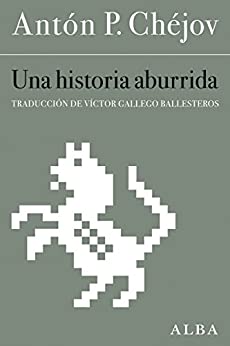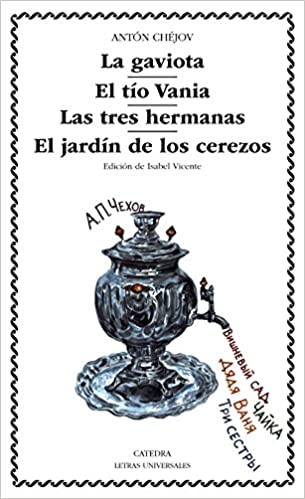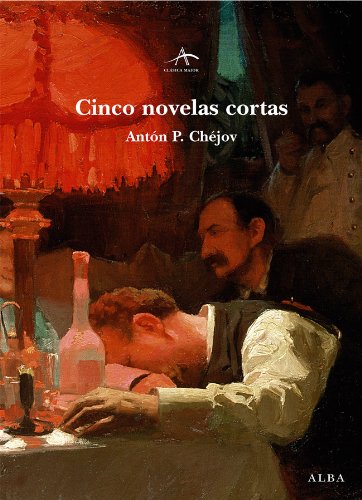As far as short narrative is concerned, Antón Chéjov it becomes the fundamental reference for anyone in love with the brief, with the synthesis, with the little great stories that can transmit that essence of the world that remains in what is suggested, in what is simply announced.
The story is an intermission of one's life, a complete reading that can be enjoyed on a journey to any place or as an accompaniment before succumbing to sleep. And in that brief perfection Chekhov emerges as the greatest genius of all. Dedicating yourself to the brief, as a writer, can be thought of as a frustrating point. Every narrator seems to point to his final novel, the one that opens up to a more complete and complex universe.
Chekhov never wrote a novel in the sense of a voluminous and capitulated work with a clear approach, development and closure. And yet, his work has survived to this day with the same force as that of any other voice. To such an extent that, together with Tolstoy y Dostoyevsky, composes an incomparable trilogy of Russian and world literature, for its diversity and depth.
Its beginnings were marked by necessity. Writers as a kind of fiction columnists were in great demand in Chekhov's time. Once consolidated, he did not stop writing about the brief, with the idea of the anecdotal, of the single scene as the best reflection of who we are.
3 essential books by Chekhov
A boring story and other stories
Discovering Chekhov is entering into those kinds of phases that every creator usually goes through. Phases marked by need or search. In this selection the first stories appear, brimming with satirical humor, as well as others that are deeper into the existential.
Summary: The anthology of stories that we present to you compiles a rich and varied sample of his art, from the stories of his early days, delicious humorous pieces, without beginning or end, that fully express the aesthetics of Chekhov: simplicity and brevity, to the stories more elaborate from his time of maturity, from 1886, where without losing an iota of humor the Chekhovian melancholy is revealed.
The selection that we offer is made up of the following titles: A boring story, Kashtanka, An enigmatic character, A guarded boy, The slander, The Swedish match, The malefactor, He exaggerated the note and The showgirl. At first glance, they seem no more than fragments of life that passes, but in reality they are the result of the most complete art.

Seagull; the three sisters; Uncle Vania
It is said that melancholy is the joy of being sad. A paradox that in Chekhov's case has to do with his physical weakness but also with his fatalistic perception of his country and his world.
In these stories he gives a good example of the writer capable of channeling the deepest, synthesized, condensed emotions, truly transmitting the most profoundly human in a world destined to exalt the worst of civilization.
Summary: These dramatic works show us the decline of Russian high society just before its fall. In this situation, the characters who know they are privileged about to plunge into chaos, react in very different ways depending on their personality: misanthropy and skepticism in those more lucid and sensitive observers, tedium and inability to react in the most fragile ones.
Chekhov reflects in his work the contradictions of the social life of his country in the late nineteenth century and on the eve of the bourgeois democratic revolution from 1905 to 1907. He ironically and ruthlessly describes the gradual degradation, both economically and culturally, of the landed gentry. focusing his attention on the fate of his own social class.
Chekhov introduced a radical change in the forms of dramaturgy, giving dramatic action a new structure capable of encompassing any manifestation of life. With a simple succession of everyday paintings he achieves general impressions, sometimes of great intensity.
Five short novels
Halfway between the extended story and the nouvelle, these five selections share the idea of the abyss of Russian society at the time, and the surrender of the characters in each of the stories.
Defeat as various sensations of an imposed destiny amidst a dead calm that at times seems to contract asphyxiatingly.
Summary: Anton P. Chekhov invented a new narrative modality in which the length was not dictated by generic conventions, but by the material of the story itself. In these Five short novels selected and translated by Víctor Gallego, we see in any case his mastery of capturing time and reflecting it narratively, with no other calendar than the one set by the characters' own actions and inactions.
They are all works of maturity: "A boring story" (1889), "The duel" (1891), "Room number six" (1892), "Story of a stranger" (1893) and "Three years" (1895).



What is «anlatı kipliği» man?
სამი საოცრად გამოხატული პროზაული ისე ლირიკული ნაშრომია როგორც მიკავს დაკანონებული დოგმა ლირიკამდე და ვნახავ თავშესაფარს იმ იქნება ზღუდე ზღუდე